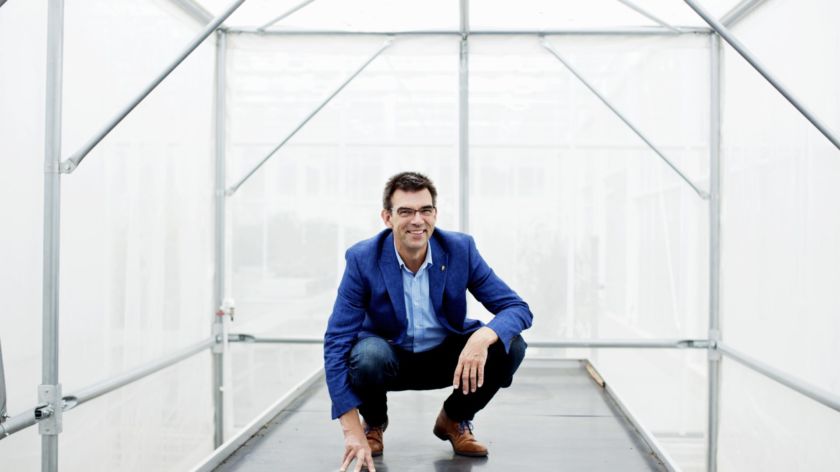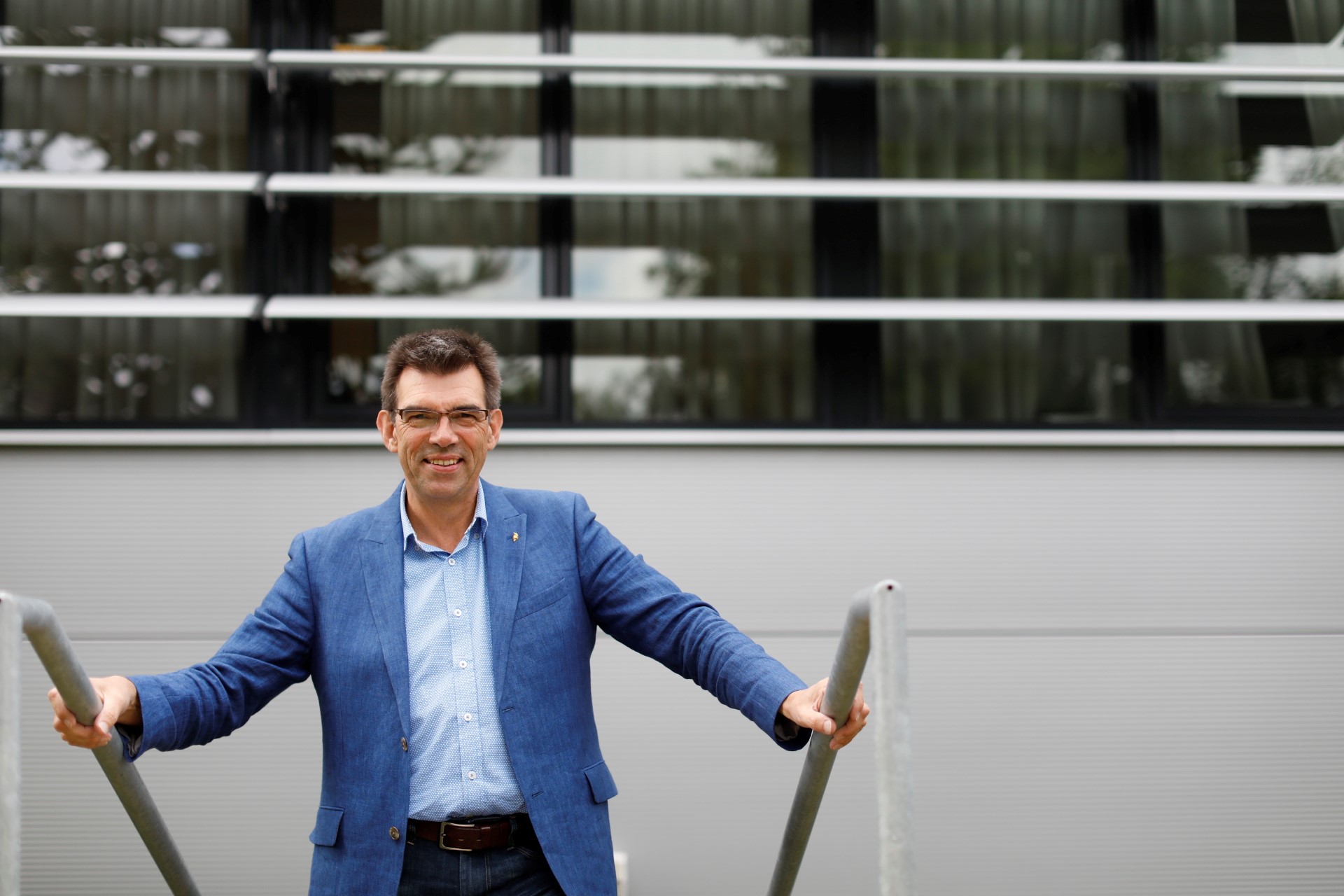Jan Bransen wants to tackle the ‘bankrupt’ educational system
-
 Jan Bransen. Foto: Duncan de Fey
Jan Bransen. Foto: Duncan de Fey
The professor who says the educational system is bankrupt and who views the majority of the students as unmotivated young people who do not know what they want to do with their lives will run the new Radboud Teaching and Learning Centre. Jan Bransen: 'Universities have become more like secondary schools.'
Jan Bransen apologises. ‘I am just back from three weeks in Cuba, and I’m still settling in.’ At times, the philosopher is visibly looking for the right words or letting silence fall. He does not yet have a standard spiel ready about the Radboud Teaching and Learning Centre. And it appears that he sometimes wants to express himself more diplomatically than he is used to, now that he is appointed as academic leader of the centre.
Bransen is rather outspoken by nature. He has stated many times in the media that the current educational system is bankrupt, and has repeated it again today. In his opinion, the university has become an institution that attracts students who do not really know what they want to do with their lives. ‘They just happened to be smart enough to breeze through VWO and then they were under the impression that there was no other choice but to study at the university.’
‘People know how to think and philosophise about what the educational system could be’
This means that the majority is unmotivated and only focused on obtaining course credits. And the lecturers are now conditioned in such a way that they mainly prepare their students for the exams, while the underlying objective – the learning process – disappears into the background.
Bransen was only recently appointed as the academic leader of the Teaching and Learning Centre. He will be seconded for three years by the Faculty of Social Sciences where he is Professor in Philosophy of Behavioural Sciences. The centre will open at Thomas van Aquinostraat 1 in January.
But what is the Teaching and Learning Centre? The website states that the university aims to ‘further improve the quality of its teaching by stimulating research in education, innovation in education, and the professional development of lecturers.’ Innovation in education and research in education are meant to go ‘hand in hand’, and the atmosphere in the centre should be ‘inspiring’.
What will the Teaching and Learning Centre do exactly?
Bransen: ‘To begin with: I am not running the Teaching and Learning Centre by myself, I form a team with three others. Two of them are already known: Mariska Kleemans and Frank Léoné (assistant professors of Communication Science and Cognitive Psychology, respectively). We will make plans together.’
‘What I can say is that we want to organise inspiration sessions, in the form of lunch meetings for example. There are many people at the university with great ideas. But there also needs to be space for lecturers’ frustrations: you can learn from each other by talking about them with others. It needs to be an easily accessible service for everyone to use.’
‘We also consider new forms of education in which all students could participate. The Teaching and Learning Centre also needs to provide for students. I do not know whether these courses will be extracurricular, or in the form of electives. But there is a great demand for small packages of education. Many people find philosophy interesting, for instance, but do not want to do a full Bachelor’s or Master’s programme.’
Why did you want to take the lead here?
Long pause. ‘Because I take Marx seriously. He wrote: ‘The philosophers have hitherto only interpreted the world in various ways; the point is to change it.’ You have to do it too. And I agree with him. People know how to think and philosophise about what the educational system could be. But I do not think anyone knows how to change it.’

Bransen’s latest book Gevormd of vervormd? (educated or deformed?) was published in February. In the book he proposes a radically different educational system. His vision is that studying and working should go together from day one. Currently, students take in abstract theoretical knowledge for four years, which they can then hardly use in the labour market. Bransen: ‘Half of my book criticises the current system, but the other half is constructive. How can it be changed?’
‘The really important thing is that you do things together. That applies to me as well. I can make talk about it until I’m blue in the face, but the point is that the system needs to be overhauled. I cannot do this by myself.’
How about the innovative power at the university in the area of education?
Bransen laughs. ‘Institutionally, of course, the university is very cumbersome. The amount of regulations, and the limitations they bring, demand a lot of significant effort to keep innovation alive. At the same time, there is no better place for limitless thinking. Coming back to Marx: there is a lot of innovative power in thinking. But how you convert it into another system, that is where the difficulty lies.’
Is there space for innovation with all those regulations?
‘Innovation also means thinking about the place that university education and science can occupy in our changing society. We live in a knowledge economy, but scientific results are not a product. They are semi-finished goods, incomplete, debatable. That does not sell well, and this is why universities are overplaying their hand by stating that they deliver products with economic value.’
‘The university also needs to consider the question: how can we be an educational institution with over 20,000 students? Traditionally, university education is small-scale and closely connected to conducting research. Throughout history, university employees only really educated the next generation of researchers, their own successors. But nowadays, most of the students do not end up working at the university. Lecturers teach their students the answers to exam questions, to allow them to receive good grades. Universities have become more like secondary schools. I also see the Teaching and Learning Centre as a mirror, a philosophical self-reflection.’
‘People need time for just hanging around so that they can start asking themselves: what am I actually doing?’
‘And this is how we want to provide space for lecturers to reflect on themselves. We want to give them the time to think about the question: how can I improve my education? Not in terms of efficiency, but in terms of… how can I embrace the education I provide as the core of what I do as a scientist?
Is there a need for that?
‘It is something people need without knowing that they need it. It takes time. Take the Cubans, they have time for everything. They just stand there waiting for an hour in front of a shop. We are so driven by time efficiency. That makes you turn reflection into a five-minute trick.’
So all lecturers should schedule an hour once in a while to visit the Teaching and Learning Centre.
‘Your approach is completely based on time efficiency when you put it that way. While people also need time to just hang around, so that they can start asking themselves: what am I actually doing? But you are not visiting a therapist here. You come to the Teaching and Learning Centre because there are other people like you to talk to. Reflection is a question of talking to other people.’
Were you surprised that you were chosen to lead the Teaching and Learning Centre?
‘I think it is very brave that they picked me. I am very vocal in my opinions. But apparently there are more people who think it cannot go on like this. I think that is great.’




A colleague schreef op 19 december 2019 om 15:16
I am all for exploring radical new ways of doing things, but I’m not sure this centre will earn much respect and yield much influence, when the starting statement is that “Lecturers teach their students the answers to exam questions, to allow them to receive good grades. Universities have become more like secondary schools.” I don’t recognise this at all among my excellent and devoted colleagues at Radboud, nor among the teachers at my childrens’ high school. Maybe it would be a good idea to start by a tour of the university and first appreciate all that is there and is being done already?